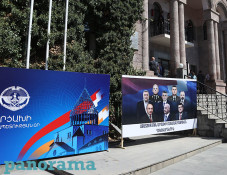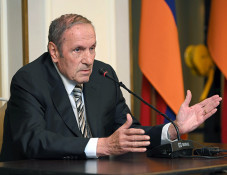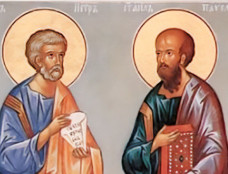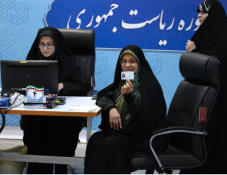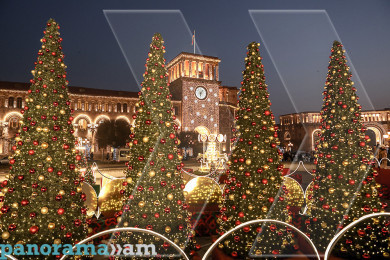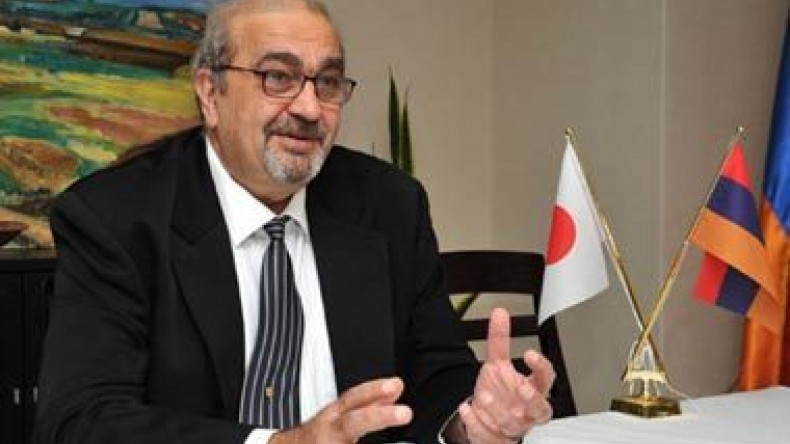
Armenian envoy acts as bridge between Japan, Armenia
Below, we present an interview of Armenia’s ambassador to Japan Grant Pogosyan at the Armenian Embassy in Tokyo.
It didn't come as much of a surprise to Grant Pogosyan when the offer came to him from the Armenian government to become his home country's ambassador to Japan.
Pogosyan, dressed in a traditional Japanese hakama, taught for 21 years at International Christian University in the city of Mitaka in Tokyo. For over 20 years, Pogosyan, 59, has lived and worked in Japan — albeit in a completely different field — teaching mathematics and computer science at International Christian University in Tokyo.
It was only two years ago that Armenia opened its embassy in Japan, although initially it did not have an ambassador. Pogosyan, one of the 30 Armenians currently living in Japan, had initially served as an adviser to the Armenian Foreign Ministry on Japanese affairs. He was later tapped as an embassy adviser and then, in May, its first ambassador.
"I think I was chosen because I had a long experience here and knew a lot about Japan. I felt it was a great honor, and felt huge responsibility to act as a bridge between Armenia and Japan," he said, adding that he hopes to introduce the Japanese people to his country, which is "generally not well known in Japan."
"I think a lot of people have a very vague image of Armenia — and think of it as a faraway country," he said. "Unless people get to know more about the country, it's difficult to expect wide-ranging collaboration between the two."
Armenia was a part of the Soviet bloc until its independence in 1991. Until then, Pogosyan said, "Armenia, like the rest of the Soviet republics, had little connection to Japan."
"Armenians, like many people in the world, held a cliche image of Japan as a country of karate, sumo, bonsai and electronics," he said. "A lot of Armenians had a general interest in Japan because of its technological prowess. However, there were few chances for most to go to Japan and get to know more about the country and its culture."
Pogosyan is one of only a handful of Armenians who have had the chance to come and work in Japan. "I was very lucky to have been able to do my own research, and to learn the Japanese language and culture in depth," he said.
Pogosyan said that in the last two decades the two countries have boosted cultural exchanges. "Especially exchanges or collaborations in music, art, and cooking in recent years," he said. But business relations remain a "slow process," he admitted, noting that apart from some official aid-linked projects done in Armenia by the Japan International Cooperation Agency, Japanese business relations with the country are still in their infant stages despite their potential.
Pogosyan was born in Gyumri, the second-largest city in Armenia, and grew up in the capital, Yerevan. He first came to Japan in 1987, to ICU as a visiting scholar supported by a grant for exchanges of young scientists between the two countries.
"I had developed a strong interest in Japanese culture and language during my student years in Moscow," he said, adding that although his focus was in mathematics, he was a member of an international students' club when he was in graduate school, and interacted with students from all over the world, including Japanese.
"I was happy when I first made my Japanese friend," he said, adding that this friend taught him some basic Japanese phrases and kanji.
Pogosyan graduated from Moscow State University with a Master of Science in mathematics, and then acquired a Ph.D. in computer science from the USSR Academy of Sciences in Moscow in 1982. He later taught computer science at a university in Armenia before coming to Japan.
In 1991, "dame moto de" (knowing there may be little chance of success), he applied for a tenure at ICU, passed and came to live in Tokyo with his Armenian wife and two children.
A self-taught fluent Japanese speaker, Pogosyan served as a mathematics and computer science professor for 21 years at ICU. He played a leading role in ICU's graduate school reforms, helping merge four different divisions to form the Graduate School of Arts and Sciences. He served as dean of the graduate school from 2008 until March of this year.
"I thought that ICU's graduate school should lower the walls between the divisions and give the students a chance to explore subjects that span across the traditional disciplines," he said. "It was important to achieve a good balance — liberating the breadth while keeping the depth of studies and research."
Pogosyan is the founding director of ICU's Global Leadership Studies program that started in 2010, a three-week intensive residential course taught in English, targeting middle management from major Japanese firms, with the aim of developing leadership skills.
"I was concerned about the challenges emerging in Japan during the postbubble (economy) period," he said. "Besides the domestic issues, today we see a decline of Japanese performance on the international stage. I thought that it may be worth trying to boost Japanese business through leadership education."
Pogosyan has also participated in activities outside of academia.
He has cooperated with the city of Mitaka in western Tokyo — his home for most of his time in Japan — where he served for over 10 years as cochairman of Mitaka's Municipal Roundtable Committee on Internalization. He has held discussions with Japanese and non-Japanese members about problems surrounding the integration of foreign nationals into the local community and solutions to those issues.
The group covered topics including cultural assimilation of non-Japanese residents and how they could live comfortably in the community, educational issues for children who just moved here from abroad, as well as disaster prevention and medical issues for foreign residents.
After living in Japan for two decades, Pogosyan now believes his mission as ambassador is to "represent my own roots, my own country, and strengthen the ties between the two."
He said that although there are stark differences between Armenians and Japanese — such as in the way Armenians value individualism while Japanese put more emphasis on teamwork — the two nations share many similarities.
"We both have mono-ethnic identities, and are mountainous nations, with relatively small amount of resources and cutting-edge technology. We are both nations that value our cultural and historical roots," he said.
The ambassador said Armenians have strength and perseverance — qualities that they have developed from having survived and overcome numerous difficulties throughout their history.
"We are a nation that has cherished and preserved a unique culture and identity," Pogosyan said. The number of Armenians who live outside Armenia is more than double the country's population. Most are scattered across Europe, America and the Middle East, but "they are preserving their culture and language while being good citizens of the countries they chose to call home," he said.
By Mami Maruko, staff writer
Newsfeed
Videos








